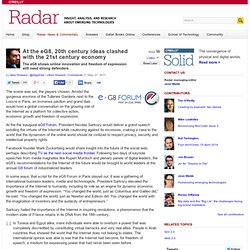

The Demand for Jobs. Businesses won't hire workers because there is not enough demand to support them, and the public can't supply the needed demand because too many people don't have jobs.

That's what's so frustrating. If the unemployed had jobs, the demand would be there to support them. But the demand has to come first, and workers won't be hired until the demand is there. I wonder who could provide the missing demand needed to overcome this problem? The Human-Capital Approach to Occupational Choice. The Fed's (inadvertent) role in the class war. To give some context to Bernanke's remarks yesterday about inflation being "transitory" and his apparent blindness to commodity inflation, investors should consider the recent paper by Gauti Eggertsson of the New York Fed which asked, "Commodity Prices and the Mistake of 1937: Would Modern Economists Make the Same Mistake?

" Eggertsson discussed the episode in 1937 when the Fed saw a burst of commodity inflation and responded with a tightening policy. He rhetorically asked: The question for the contemporary reader is this: If we could transport a modern-day economist back to 1937, would he or she have made the same mistake? My suggested answer—admittedly somewhat hopeful—is no. I base this view on the fact that most economists today distinguish between the temporary movements in the consumer price index that stem from volatility in commodity prices and the movements that reflect fundamental inflation pressures.
Indeed, we can see that philosophy at work at the Fed. The Evolving Structure of the American Economy and the Employment Challenge. Authors: A.

Michael Spence, Distinguished Visiting Fellow, and Sandile Hlatshwayo, Researcher, Stern School of Business, New York University Publisher Council on Foreign Relations Press Release Date March 2011 52 pages Share Overview This Working Paper by Nobel Laureate Michael Spence and Sandile Hlatshwayo is a detailed examination of the changing shape of the American economy and the effect of these changes on the labor market and the cost of goods. They note that the American economy has seen the lower and middle components of the value-added chain moving to the rapidly growing markets abroad and warn that soon higher-paying jobs may follow low-paying jobs in leaving the United States.
Michael Spence is distinguished visiting fellow at the Council on Foreign Relations and professor of economics at New York University's Stern School of Business. Sandile Hlatshwayo is a researcher at New York University's Stern School of Business. Employers Spend on Equipment Rather Than Hiring. Workers are getting more expensive while equipment is getting cheaper, and the combination is encouraging companies to spend on machines rather than people.

“I want to have as few people touching our products as possible,” said Dan Mishek, managing director of Vista Technologies in Vadnais Heights, Minn. “Everything should be as automated as it can be. We just can’t afford to compete with countries like China on labor costs, especially when workers are getting even more expensive.” Vista, which makes plastic products for equipment manufacturers, spent $450,000 on new technology last year. During the same period, it hired just two new workers, whose combined annual salary and benefits are $160,000. Two years into the recovery, hiring is still painfully slow. With equipment prices dropping, and tax incentives to subsidize capital investments, these trends seem likely to continue.
“Firms are just responding to incentives,” said Dean Maki, chief United States economist at Barclays Capital. At the eG8, 20th century ideas clashed with the 21st century economy. The scene was set, the players chosen.

Amidst the gorgeous environs of the Tuileries Gardens next to the Louvre in Paris, an immense pavilion and grand dais would host a global conversation on the growing role of the Internet as a platform for collective action, economic growth and freedom of expression. At the the inaugural eG8 Forum, President Nicolas Sarkozy would deliver a grand speech extolling the virtues of the Internet while cautioning against its excesses, making a case to the world that the dynamism of the online world should be civilized to respect privacy, security and intellectual property rights. Facebook founder Mark Zuckerberg would share insight into the future of the social web, perhaps describing TV as the next social media frontier. In some ways, that script for the eG8 Forum in Paris played out.